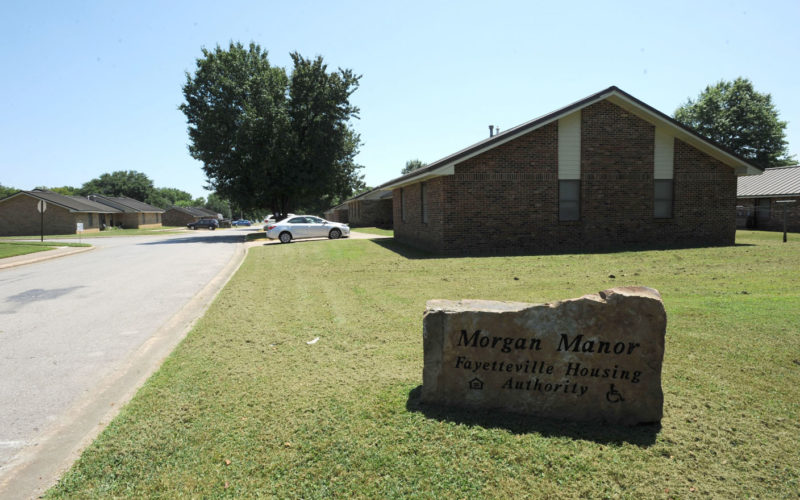Housing authority sets sights on revitalization
STACY RYBURN
sryburn@nwadg.com
The Fayetteville Housing Authority wants to get into the development game.
To do that, it will have to change how it operates, as other housing authorities have done across the country.
The authority operates four properties with nearly 250 units total — Hillcrest Towers at 1 N. School Ave., Willow Heights at 10 S. Willow Ave., Lewis Plaza at 401 S. Lewis Ave., and Morgan Manor at 324 E. 12th Place.
Hillcrest, Willow Heights and Lewis Plaza are public housing. Morgan Manor is under a different federal rental-assistance program.
Another 480 residents live at private properties through housing vouchers the authority administers. Additionally, 120 veterans have vouchers under the Veterans Affairs Supportive Housing program.
The authority also has a nonprofit group, FHA Development Inc., it can use to purchase, renovate and build properties. In April, it bought the former Hi-Way Inn and Motel, 1140 N. College Ave., and renamed it North Gate. The plan is to convert the 20 rooms at the motel into studio apartments and house veterans.
The authority’s overall goal is to create more affordable places to live in the city, said Executive Director Angela Belford. People living in public housing, people with a voucher for rental assistance and people who don’t need a voucher would all live on the same property, she said.
The authority wants to start with the properties it already owns. Lewis Plaza, for instance, is in bad shape, board members and administrators have said. The foundations on the buildings are unsound. The authority wants to redevelop the property, keeping residents living in public housing there within public housing, but also add units at a fair market rate. The federal government sets the fair market rate. For this year, rent for a one-bedroom apartment in Washington County is $586. A two-bedroom is $758.
In a possible scenario, new public housing units would be operated by the authority. New market-rate units would be built under the development nonprofit group.
For Willow Heights, about 20 new fair-market rate units could fit along with the public housing units. The University of Arkansas’ Community Design Center last year gave the authority design concepts to revitalize Willow Heights.
The authority has about 2 acres it could build on at Morgan Manor. Authority board members during a retreat this year discussed building row homes through the nonprofit group.
The question will be figuring out how the development group and the authority’s regular budget would interact, Belford said. One possible program would allow the authority to take out a loan to build public housing. Another possibility is to borrow money from the authority’s five-year capital budget, and pay it back over 20 years. Revenue would come from the rent collected, she said.
The development nonprofit group could enter into an equity partnership with lenders, whether they be individuals or organizations, borrow money and pay the loan in favorable terms with rent revenue, Belford said. Some cities have partnerships between hospitals and nonprofit groups to provide housing. The authority could follow that model as well, she said.
“There are people who can loan you money — not give you money,” Belford said. “You just have to run it like a business so you can make a mortgage payment.”
The federal government in the last few years has become increasingly open to the ways housing authorities can get money, said Adrianne Todman, chief executive officer of the National Association of Housing and Redevelopment Officials. Many of the longstanding barriers have been removed, and more programs have popped up. Authorities across the country have taken notice, she said.
For instance, it’s become a fairly common practice for housing authorities to partner with developers, or have staff members with construction experience. Most of the public housing in the country finished building in the 1970s, Todman said. However, housing authorities have a renewed interest in development, she said.
“Housing authorities being developers — while it might be unique in certain parts of the country, it’s certainly not a new concept,” she said.
The city’s Housing Authority is following suit. In the budget proposal board members saw Thursday, Belford included a new position, director of housing, that would be a full-time construction manager.
An increase in money from the federal government and sufficient reserve will cover the new position, Belford said. There’s about $750,000 in reserve. The amount for operating subsidies from the government fluctuates every month. Belford said she usually budgets for about $40,000, but last month the authority received more than $70,000, for example.
The authority’s budget cycle covers October through September. The most recent budget, combining public housing and Section 8, was nearly $1.5 million. The authority is working on the next budget.
Its capital budget for this year of about $295,000 is separate. The amount increased from $281,000 last year and $185,000 in 2017.
The vision the authority has for its properties is likely a 10-year-or-more endeavor, said Melissa Terry, board chairwoman. A long-range planning document needs to be put together first.
Ultimately, the idea is anyone looking at an authority-owned property wouldn’t be able to tell the difference between what is and isn’t public housing, Terry said.
“Part of it is a way to lift up the dignity of our residents and create a more representative blend of community members,” she said. “We want to create an equal-housing landscape.”
__
Web watch
For more information, go to:
fayettevillehousingauthority.org






